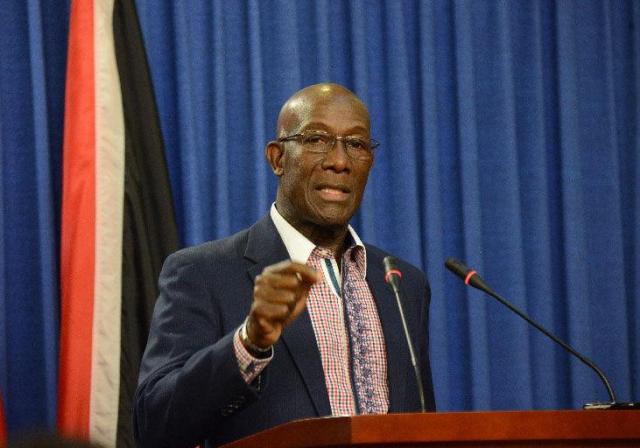
Prime Minister Dr Keith Rowley has denied that Venezuelan President Nicolas Maduro called for a meeting between the authorities of both countries because of the deportation of the children.
By Ria Taitt / Daily Express
He said he received a three-page letter from Maduro a couple of days ago and it dealt with the Venezuela situation vis-à-vis its treatment from the United States government with respect to Venezuela’s ability to spend its own money, to conduct its business and the effects of sanctions in general on Venezuela.
In an interview on CNC3’s The Morning Brew yesterday, the Prime Minister said the Government could not afford to take the position that children will not be deported.
“If you say that children will not be deported, all that will happen across the border is that they put all their children in a boat and send them to Trinidad.
“If you say that in Trinidad and Tobago the policy is that once the children get here they are welcome to stay, then how many tens of thousands are you inviting to Trinidad and Tobago?” he said rhetorically.
Rowley said Government will look at every instance on a case-by-case basis but “will not put up a flag” to say once a child reaches here they now have the right to stay. There are lawyers in the court right now arguing for the constitutional rights of Venezuela children. The bottom line is that these immigration issues are not only about emotion,” he said.
He said it is quite likely registered Venezuelans would be allowed to stay here until things in Venezuela normalise but warned that if they engage in trafficking or law-breaking to bring other Venezuelans they will forfeit the right to be registered. “We will de-register them,” he said.
Connivance in crossings
The Prime Minister said there were people in Venezuela organising the illegal crossings with the connivance of locals.
“There are people in Venezuela who are organising people (over there) telling them that if they go to Trinidad where things are better… If you get across to Trinidad beaches, or into Cedros or Port of Spain, this is your contact.
“And there are people in Trinidad and Tobago, who would like to be humanitarian and I would receive them. And what you’re really doing is increasing the population of Trinidad and Tobago.
“In that kind of migration there is hardly a day when you could get up and say ‘go back home fellas and ladies where you belong’ … And history has shown whenever you put people in that kind of situation, I know of no refugee camp in the world post World War II which has emptied. Once you start it the next generation of children are your citizens,” Rowley said.
“What we have to be careful with, some of the arguments being presented in the courts, if those arguments are accepted and put into law in Trinidad and Tobago, I would simply want to warn that it would not apply only to Venezuelans coming here illegally. It would apply to anybody (entering illegally) who is not a citizen of Trinidad and Tobago,” he said, adding that he did not think that was what the people of Trinidad and Tobago would want.
Rowley said there were “people saying to hell with” the country’s immigration protocols and laws, just “come into the country, find the right lawyer and the right judge and be home and dry”.
Noting that the British Coast Guard spend day and night stopping migrants crossing the English channel in their attempt to illegally enter the UK, the Prime Minister said, “Do you think that if this Government is dissatisfied with (court) decisions being made here and it goes to Privy Council, you expect that the Englishmen in the Privy Council will tell us that in our country anybody in a boat could land on our beach and we must accept them.
“But in England anybody illegally entering (their country) … the British government will determine whether they come in or not”.
He said one could have one law for them and one for us.
Stressing that there had never been restrictions on Venezuelans coming in until now, the Prime Minister said: “This situation demanded that the Government pay attention to the potential of being swamped by large numbers of people that will create bigger problems for us in Trinidad than they have in Venezuela.
One hundred thousand or 200,000 people from Venezuela (coming) into Trinidad and Tobago will create a crisis here which we have not even thought about … it could create difficulties here where we may have to go to Venezuela instead,” he said.

